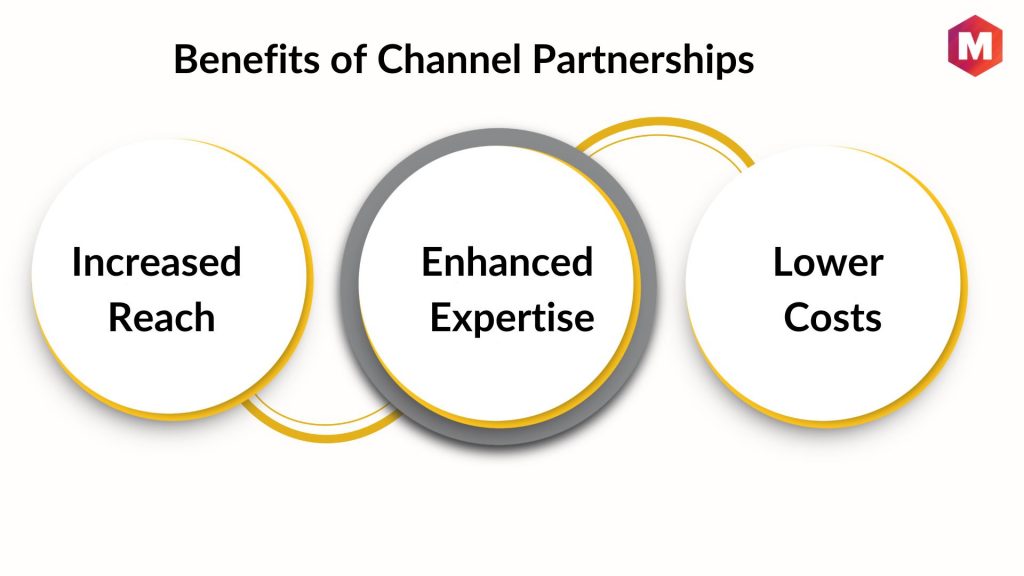Channel Partners are third-party organizations that resell or distribute a company’s products or services. Channel partners can be valuable allies in extending a company’s reach into new markets and existing customers segments. Channel partners typically have established relationships with customers that a company may not have, and they can provide valuable insights into local market trends.
A channel partner is a firm that sells items and services for a technology manufacturer or vendor. Such technologies might be hardware-based, conventional software, SaaS or Software as a Service, or cloud computing solutions. The channel partner is part of the vendor’s indirect sales force, which means that they sell the goods and services on behalf of the vendor but are a separate firm. They may also sell items produced by other suppliers as well as their own products and services.
Table of Contents
Who is a Channel Partner?
Definition: A channel partner is an entity that is in a business relationship with the company and sells the companies products or services through other partnering companies, rather than selling directly to customers. Hence businesses that help promote, sell, and distribute a company’s products or services are called channel partners. Channel partners can include resellers, distributors, systems integrators, service providers, and independent software vendors (ISVs).
Channel partners are typically well-connected with their local markets and have established relationships with customers that a company may not have. Channel partners can provide valuable insights into local market trends and help extend a company’s reach into new markets and customer segments. A Channel Partner program is a type of service provider that offers managed IT services to businesses. Channel Partner is also known as Managed Service Provider or MSP. MSPs typically provide a wide range of IT services, including network and system administration, application development and maintenance, and data center management.
Why Use Channel Partners?
Channel partners can be an important part of your go-to-market strategy or sales efforts particularly if you are looking to expand your reach into new markets or grow your customer base. Channel partners can provide valuable resources and expertise, including:
- Access to new markets and customer segments
- Local market knowledge and insights
- Sales and marketing support
- Technical assistance and training
- Work as solution providers and affiliate partners
- Empower a business to connect with new customers
- Optimize sales process of in house sales team
How Channel Partnerships Work
Channel partnerships can take many different forms, but there are three common types of Channel Partner strategy relationships:
1. Reseller
A reseller is an organization that purchases products or services from a company and then resells them to its own customers.
2. Distributor
A distributor is an organization that purchases products or services from a company and then sells them to resellers.
3. Systems integrator
A systems integrator is an organization that specializes in designing and implementing complex technology solutions.
Channel partners typically have established relationships with customers that a company may not have, and they can provide valuable insights into local market trends.
The Benefits of Channel Partnerships
Channel partnerships can offer a number of benefits to both companies, including:
1. Increased reach
Channel partners can help you expand your reach into new markets and customer segments.
2. Enhanced expertise
Channel partners can provide valuable resources and expertise, including local market knowledge, sales and marketing support, and technical support.
3. Lower costs
Channel partnerships can be a cost-effective way to grow your business, as they can help you avoid the expense of setting up your own direct sales force.
Using a partner channel program helps in targeting new market segments, optimizing market share, and ensuring customer success. Channel partners act as lead generation tools that improve channel sales and increase revenue.
Types of Channel Partnerships
1. Channel Value-Added Resellers (VARs)
Channel VARs are organizations that purchase products or services from a company and then resell them to their own customers. Channel VARs add value to the products or services they resell by incorporating them into larger solutions that they sell to their customers.
2. Service Delivery Partners (SDPs)
Service Delivery Partners are organizations that provide professional services to help their customers implement and use the products or services they have purchased. SDPs typically have established relationships with customers and can provide valuable insights into local market trends.
3. Technology Alliance Partners (TAPs)
Technology Alliance Partners are organizations that have formed a strategic alliance with a company to jointly market and sell their products or services. TAPs typically have complementary products or services and share a common customer base.
4. High-Velocity Partners (aka Fulfillment)
High-Velocity Partners are organizations that have the necessary infrastructure and expertise to quickly fulfill large orders of a company’s products or services. High-Velocity Partners typically have established relationships with customers and can provide valuable insights into local market trends.
5. Managed Service Providers (MSPs)
Managed Service Providers are organizations that provide managed services, which are typically IT-related services, to their customers. MSPs typically have established relationships with customers and can provide valuable insights into local market trends.
6. Global Systems Integrators (GSIs)
Global Systems Integrators are organizations that specialize in designing and implementing complex technology solutions. GSIs typically have established relationships with customers and can provide valuable insights into local market trends.
7. Embedded Partners (often referred to as “white label” partners)
Embedded partners are organizations that integrate a company’s products or services into their own products or services. Embedded partners typically have established relationships with customers and can provide valuable insights into local market trends.
8. Original Equipment Manufacturer (OEM)
OEMs are organizations that manufacture products that incorporate a company’s products or services. OEMs typically have established relationships with customers and can provide valuable insights into local market trends.
9. Strategic Partners
Strategic partners are organizations with which a company has formed a strategic alliance. Strategic partners typically have complementary products or services and share a common customer base.
The Risks of Channel Partnerships
Channel partnerships also involve some risks, including
1. Loss of control
When you partner with another organization, you lose some control over how your products or services are marketed and sold.
2. Channel conflict
Channel conflict can occur when your direct sales force competes with your channel partners for customers. Channel conflict can also occur when your channel partners compete with each other for customers.
3. Dependence on partners
Channel partnerships can make your business dependent on your partners. If one of your partners goes out of business, you may lose some of your customers.
4. Loss of margins
Channel partnerships can lead to a loss of margins if your partners are able to sell your products or services at a discount.
Channel partnerships can be a great way to grow your business, but they also involve some risks. Before entering into a channel partnership, you should carefully consider the risks and benefits involved.
What makes a good channel partner?
Not all channel partners are created equal. When choosing a channel partner, you should look for an organization that:
1. Is committed to your success
A good channel partner is committed to your success and will work with you to ensure that your products or services are successful in the market.
2. Has a proven track record
A good channel partner has a proven track record of success in selling and marketing products or services.
3. Has established relationships
A good channel partner has established relationships with customers and can provide valuable insights into local market trends.
4. Is financially stable
A good channel partner is financially stable and can support your business over the long term.
5. Is aligned with your business
A good channel partner is aligned with your business goals and objectives.
Channel partnerships can be a great way to grow your business, but you need to choose your partners carefully. Look for an organization that is committed to your success and has a proven track record of success.
Here is a video by Marketing91 on Channel Partner.
How to find the right channel partner?
There are a number of ways to find potential channel partners, including online directories, industry events, and personal connections.
1. Online directories
Search for online directories that list channel partners in your industry or geographic region.
2. Industry events
Attend industry events and trade shows to meet potential channel partners.
3. Personal connections
Ask your personal network of contacts if they know of any potential channel partners.
4. Research
You can research potential channel partners online or in industry publications.
5. Referrals
You can ask other businesses in your industry for referrals to good channel partners.
6. Trade shows
You can meet potential channel partners at trade shows and other industry events.
When looking for a channel partner, it’s important to do your research. Ask for referral partners from other businesses in your industry, and meet potential partners at trade shows and other events. With a little effort, you should be able to find the perfect partner for your business. Channel partnership can help you grow your business, but you need to choose your partners carefully.
Channel Partners vs. Direct Sales
When it comes to selling, there are two main options: direct sales and channel sales partners. Channel sales involve enlisting the help of third-party resellers, while direct sales involve selling products and services directly to customers.
There are pros and cons to both approaches. Channel sales can reach a larger audience and generate more leads, but they can also be more expensive and time-consuming. Direct sales, on the other hand, are more efficient but may not reach as many potential customers.
Ultimately, the best approach depends on the products or services being sold, the resources available, and the goals of the company. Channel partners can be a valuable asset for companies that want to grow their customer base and increase sales. However, direct sales may be a better option for companies that are selling simple products or services and have a limited budget. Channel partners can also be a good option for companies that want to test the market before investing in a more expensive direct sales approach.
Channel partner programs can be complex, with different tiers of resellers and various levels of discount. It’s important to carefully consider all the options before choosing a channel partner. The wrong partner can lead to lost sales and frustrated customers.
Conclusion!
One of the simplest methods to enhance company development is to collaborate with one or more channel partners. There are a variety of partner types to investigate if you’re looking for alternative market approaches. Each has advantages and disadvantages.
Begin by learning about the differences in each kind of channel partnership, so you can choose those that are most suited to your company’s goals. But don’t get too hung up on nomenclature: many of these connections will transition, develop, and deepen over time, delivering the greatest benefit to your business at that point.
If you’re just getting started with a particular channel, don’t attempt to cover every possible way to market. Spend time and connect with the partner who best fits your technology and can assist you in scaling your business.
Liked this post? Check out the complete series on Distribution


Great post. Keep posting such kind of info on your page. Am really impressed by your blog.
Great content! This is exactly the sort of thing I was looking for. Thanks for your help ?